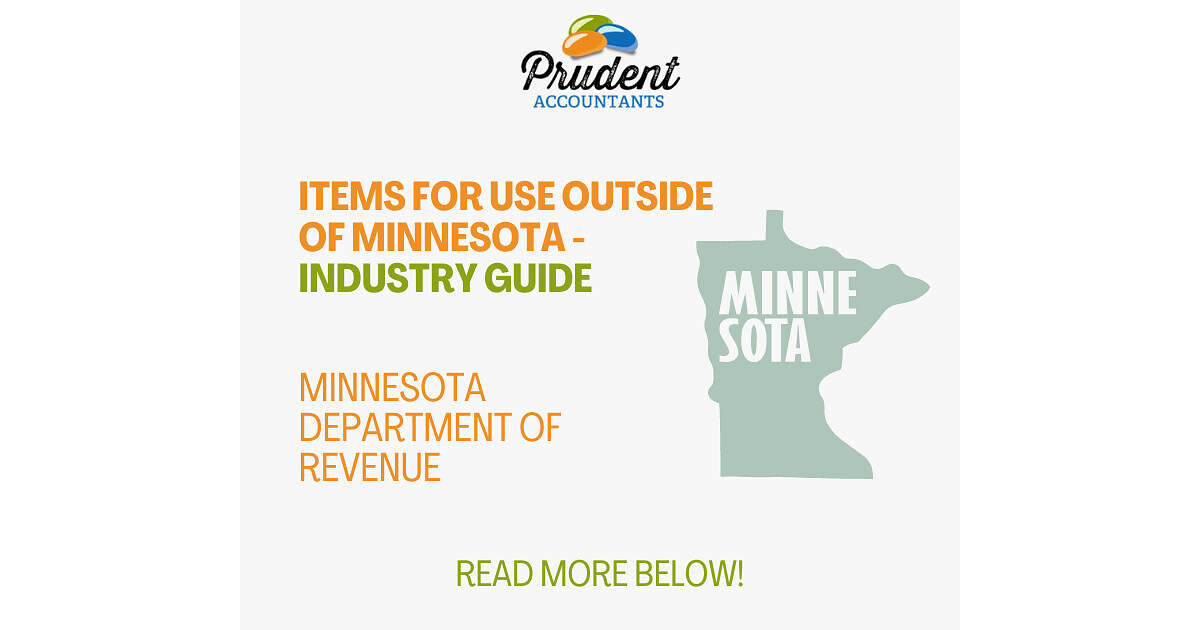Items for Use Outside of Minnesota – Industry Guide

This fact sheet covers:
- Items delivered outside Minnesota
- Items delivered into Minnesota and stored in a public warehouse
- Items picked up in Minnesota for business use outside Minnesota
- Advertising materials used outside Minnesota
- Direct mail
- Direct pay businesses
- Drop shipments
- Local Sales and Use Taxes
Items Delivered Outside Minnesota
Minnesota sales tax does not apply to items delivered outside of Minnesota. It does not matter who arranges the delivery. The item can be delivered:
- In the seller’s vehicle
- By common carrier
- By a carrier for hire
- By U.S. mail
The ship to address must be specified on the invoice. The seller must keep documentation to support the item was delivered outside of Minnesota. However, you may be required to charge and remit sales tax to the state the item was shipped. Contact that state directly for your sales tax obligations.
Note: If the purchaser takes possession of the goods in Minnesota, the sale is subject to Minnesota sales tax
Examples
- A customer buys a table in Minnesota and has the seller deliver it to Iowa. Minnesota sales tax does not apply because it is delivered outside Minnesota.
- A Minnesota company sells equipment to a Florida company. A common carrier is hired to pick up the equipment in Minnesota and deliver it to Florida. Minnesota sales tax does not apply because it is delivered outside Minnesota.
Items Delivered Into Minnesota and Stored in a Public Warehouse
Items purchased outside Minnesota are not taxable if all the following conditions are met:
- The items are brought into Minnesota by for hire carrier
- The items are kept in a public warehouse
- The items are later shipped outside Minnesota by common carrier for the purchaser’s business use
- The purchaser never takes possession of the items in Minnesota
Public Warehouse
A public warehouse is a building, structure, or part of a building or structure that is used to store (or warehouse) goods for compensation. The warehouse must be open to the public for use.
A public warehouse does not include a facility where the party storing goods:
- Rents and occupies the space as a tenant; and
- The tenant assumes the entire risk of loss per a written contract between the landlord and tenant.
Items kept in a public warehouse remain in the stream of interstate commerce. No Minnesota sales tax is due because the purchaser does not take possession of the items in Minnesota.
If the purchaser takes physical possession of the goods at any time, a taxable use occurs. Examples include:
- Items shipped into Minnesota by a common carrier and delivered to the purchaser’s location. The purchaser transfers the items from their location to a public warehouse for storage.
- Items placed in a public warehouse by a common carrier and the owner takes them out of the warehouse
- Items placed in the owner’s warehouse or a warehouse that does not meet the definition of public warehouse.
Example
Items are delivered by ship to a customer in Duluth, Minnesota. The items are delivered by common carrier from the ship to a public warehouse. Some items will be used in Minnesota. Other items will be used in other states. All items will be transported by common carrier to the various locations for use.
The items that are used in Minnesota are subject to Minnesota sales or use tax.
Items delivered by the common carrier to another state are not subject to Minnesota sales or use tax because the purchaser does not take physical possession of the items in Minnesota.
Items Picked Up in Minnesota for Business Use Outside Minnesota
Items picked up by the purchaser in Minnesota are taxable unless one of the two conditions applies:
- The items are repair or replacement parts used in the other state or country as part of a maintenance contract; or
- The items are not taxable in the state or country they are transported to. Note: Alaska, Delaware, Montana, New Hampshire, and Oregon do not have sales or use tax.
If one of the two above conditions apply, then all of the following must also be met:
- The items are transported outside Minnesota by the customer;
- The items cannot return to Minnesota except in the course of interstate commerce; and
- The customer may not have any intermediate use. Note: Storage, processing, fabricating, manufacturing, attaching to, or incorporating into other property are not intermediate use in this instance
To claim exemption, give the seller a completed Form ST3, Certificate of Exemption.
Examples
- A store buys display cases from an out-of-state manufacturer. The cases are delivered to the store in Minnesota. The store will use one display case in Minnesota and ship the remaining cases to their store in North Dakota.
- Minnesota sales tax applies to all of the cases because the store took possession of the display cases in Minnesota
- A company buys three computers from an out-of-state company. The computers are delivered to a Minnesota company and software is installed. One computer stays in Minnesota, one is shipped to Wisconsin, and one is shipped to Oregon.
Minnesota sales tax applies to the computers used in Minnesota and Wisconsin because the company took possession of the computers in Minnesota Minnesota sales tax does not apply to the computer shipped to Oregon, because Oregon does not have sales tax.
Drop Shipments
A drop shipment is the sale of tangible personal property when the seller:
- Accepts an order from a customer;
- Places the order with a third party, such as a manufacturer or wholesaler (drop-shipper); and
- Tells the third party (drop-shipper) to deliver the item directly to the customer.
The third party (drop-shipper) may deliver the item in its own truck, arrange for delivery by the hire carrier, or have the customer pick up the item.
The third party (drop-shipper) should receive a completed Form ST3, Certificate of Exemption from the seller for resale.
The seller must collect and remit Minnesota sales tax if they are required to collect sales tax in Minnesota, or if they voluntarily registered to collect Minnesota sales tax.
If the customer was not charged sales tax by the seller, they owe use tax on the purchase price.
Miscellaneous
Advertising Materials Used Outside Minnesota
Advertising materials for use outside the state are exempt. This exemption applies even if the customer takes possession of the advertising materials in Minnesota.
For more information, see the Advertising Fact Sheet 133.
Direct Mail
Where direct mail is sourced determines if it is “advertising and promotional direct mail” or “other direct mail”. For more information, see the Direct Mail and Fulfillment Services Fact Sheet.
Direct Pay Authorization
Businesses with a Direct Pay authorization follow the general rules for paying use tax. Use the guidelines above to determine if Minnesota Use Tax is due on items bought out-of-state and stored in Minnesota
For more detailed and specific information on Items for Use Outside of Minnesota , you can contact Prudent Accountants, or visit at Items for Use Outside of Minnesota – Industry Guide







